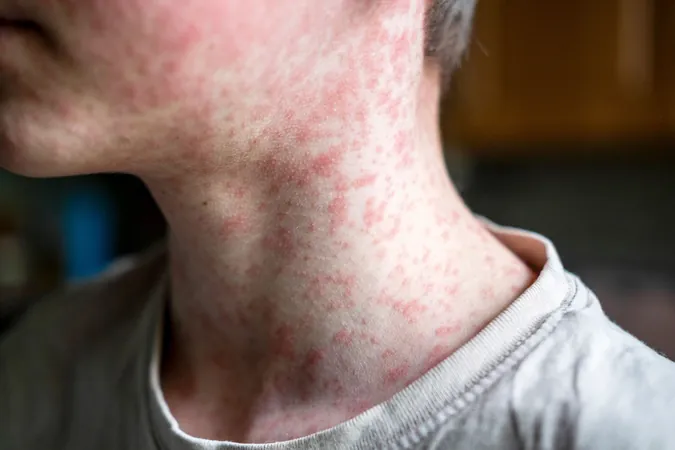
Measles Outbreak Alert: What Pharmacists Need to Know
2025-04-24
Author: Sarah
Surge in Measles Cases Raises Alarm
Measles is making a startling comeback, with cases in the U.S. skyrocketing from just 1 in December 2024 to a staggering 378 by March 2025! This alarming jump represents a more than threefold increase compared to the previous year, bringing with it the tragic news of two recent deaths linked to the disease—both individuals were unvaccinated. Once considered under control, measles is now a growing risk, particularly for those opting out of vaccinations.
Understanding Measles Symptoms
So, what happens if you catch this contagious virus? Initially, measles mimics cold or flu-like symptoms: a runny nose, cough, watery eyes, and fever. By days two or three, telltale white spots appear inside the mouth, followed by a rash that starts around the hairline and spreads across the body. Unfortunately, serious complications can arise, including pneumonia and encephalitis, especially for those who are unvaccinated.
The Contagious Nature of Measles
Measles is incredibly contagious—if you're not immune, there's a whopping 90% chance you'll contract it upon exposure! The virus lingers in the air for up to two hours after someone with measles sneezes or coughs, allowing it to spread swiftly and silently.
Vaccination: The Best Protection Against Measles
The CDC strongly recommends that all children receive two doses of the measles vaccine, starting at 12 to 15 months, with a second booster at 4 to 6 years. Adults who missed their childhood vaccinations should also get immunized, especially those in high-exposure jobs like healthcare. Pregnant individuals and anyone with compromised immune systems should not receive the vaccine.
Who is Considered Immune?
If you've had measles before, you’re immune and won’t need the vaccine. Those born before 1957 are generally considered immune due to likely prior exposures but should consider vaccination if they work in healthcare settings.
What Changes During Outbreaks?
During an outbreak, recommendations may adjust. For instance, children younger than one may need vaccinations, and the timing of doses could be altered for other age groups.
Concerns About Past Vaccination
If you received the killed measles vaccine prior to 1968, it’s advisable to get revaccinated with the current live measles vaccine, which is far more effective.
Timing of Vaccines Matters
Recent vaccinations shouldn’t interfere with the measles vaccine's effectiveness—especially against non-live vaccines like COVID-19. However, live vaccines should be scheduled carefully to ensure the immune response is optimal.
The Vitamin A Myth
You might have heard suggestions about vitamin A preventing measles—this is a myth! While vitamin A doesn’t stop measles, low levels can lead to severe complications if children do contract the virus. Hospitalized children may be given vitamin A to manage these issues, but it is not a preventative measure.
Conclusion: Stay Vigilant and Educated
The surge of measles cases underscores the critical role pharmacists play in community health through vaccination efforts. Staying informed and ready to answer concerned patients' questions could be key to preventing further outbreaks.



 Brasil (PT)
Brasil (PT)
 Canada (EN)
Canada (EN)
 Chile (ES)
Chile (ES)
 Česko (CS)
Česko (CS)
 대한민국 (KO)
대한민국 (KO)
 España (ES)
España (ES)
 France (FR)
France (FR)
 Hong Kong (EN)
Hong Kong (EN)
 Italia (IT)
Italia (IT)
 日本 (JA)
日本 (JA)
 Magyarország (HU)
Magyarország (HU)
 Norge (NO)
Norge (NO)
 Polska (PL)
Polska (PL)
 Schweiz (DE)
Schweiz (DE)
 Singapore (EN)
Singapore (EN)
 Sverige (SV)
Sverige (SV)
 Suomi (FI)
Suomi (FI)
 Türkiye (TR)
Türkiye (TR)
 الإمارات العربية المتحدة (AR)
الإمارات العربية المتحدة (AR)